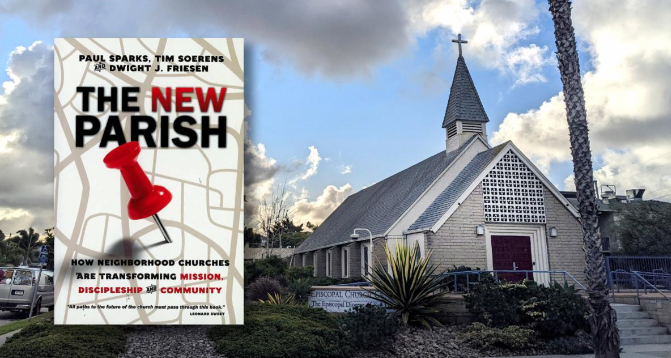Eight Tips to Enjoy a Book Study

This year, as part of the Year of Service, EDSD is studying one book: The New Parish: How Neighborhood Churches are Transforming Mission, Discipleship, and Community. Churches across the diocese are encouraged to gather in small groups to explore how your church can be known to our neighbors through care, reconciliation, and renewal. After all, a church that cares for its neighborhood is the type of church others want to join.
Bishop Susan Brown Snook said, “This book is an excellent example of how churches can lead local neighborhoods to the gift of God’s love through service and action. I encourage you to join your church’s book group and engage in the life-giving joy of sharing Christ’s love with your neighborhood.”
Each chapter in The New Parish concludes with questions for conversation and missional practices for congregation members—making facilitating a book study much easier.
In preparation for your congregation’s book study, you will want to begin by selecting a facilitator, a time, and a place to meet. Set up sign-ups for participants and provide information for members to acquire books ahead of time. Promote the book study during worship and invite members to participate. For more small group ideas, you can utilize our Faith to Go resources for small groups.
Here is a suggested book study schedule for reading and discussing each week:
Week 1—Feb. 22 to Mar. 1: Introduction and Chapter 1
Week 2—Mar. 1 to Mar. 8: Chapter 2 and Chapter 3
Week 3—Mar. 8 to Mar. 15: Chapter 4 and Chapter 5
Week 4—Mar. 15 to Mar. 22: Chapter 6 and Chapter 7
Week 5—Mar. 22 to Mar. 29: Chapter 8 and Chapter 9
Ask your clergy about the Diocese-wide Lenten Book Study, and find out when your local group starts meeting. Below are eight tips for enjoying a book study:
- Make notes and mark pages as you go
Reading a book discussion–whether as a leader or participant– is different from reading just for pleasure. Notes help you recall what was significant or call to attention something the author included that you found interesting. Plus, making notes as you go slows down your reading–making it a more intentional time of reflection. - Ask tough questions of yourself and the book
Don’t be afraid to ask hard questions. Often the author is presenting difficult issues for that very purpose. Look for questions that may lead to in-depth conversations with your group and make the book more meaningful. - Pay attention to the author’s message
Remember that a good author uses every word in deliberately. Critical reading improves with practice. Try to be aware of what the author is revealing about herself and what she wants you to learn about life from her perspective. - SPEAK UP! Group discussion is like a conversation; everyone takes part in it. Each speaker responds to what the person before them said. Enjoy the spontaneous exchange of ideas and opinions. The discussion is your chance to say what you think about the text. During a book discussion, what you’re really discussing is everything that the author hasn’t said. Look forward to saying, “Gee, I never knew that.” or “Isn’t that interesting.”
- Notice the structure of the book
Sometimes an author structures a book to illustrate an important concept or to create a mood. Notice how the author structured the book. Are chapters prefaced by quotes? If so, how do they apply to the chapters? How does the sequence of ideas unfold to create a greater understanding? Is it written in flashbacks? - Share your viewpoint and experience
Don’t expect to be called on to speak; enter into the discussion with your comments. When disagreeing with other people’s interpretations or opinions, say so and tell why, in a friendly way—considering all points of view are important to group discussions. - Make comparisons to other books and authors
Compare The New Parish to others books by Paul Sparks, Tim Sorens, or Dwight J Friesen. Or compare it to books by other authors. Often, themes run through authors’ works that are more realized by comparison. Comparing authors’ works may help you solidify your opinions, as well as reveal what you may otherwise miss. - Listen to others
Try to understand the other person’s point of view. Remember, there are several points of view possible on every question.